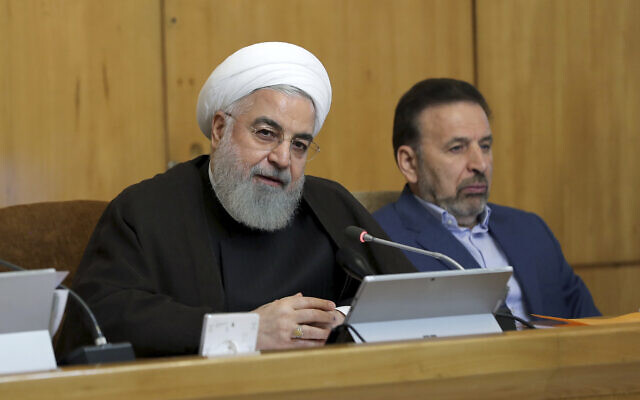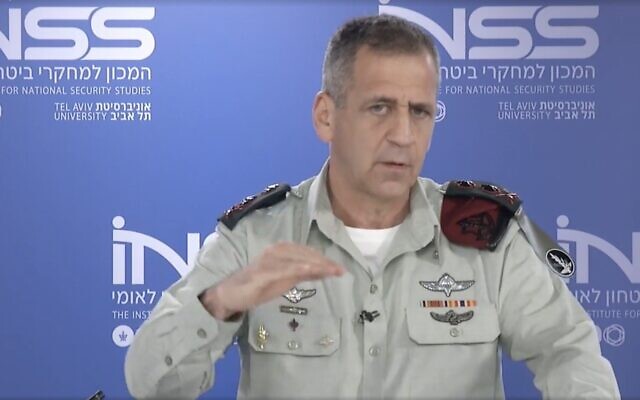Responding to IDF chief, Iran says it’s ‘serious’ about defending itself
After Kohavi announces he’s ordered fresh plans to hit Iranian nuclear sites, top Tehran official scoffs at Israel’s capabilities

Iranian President Hassan Rouhani speaks during a cabinet meeting, as his chief of staff Mahmoud Vaezi sits at right, in Tehran, Iran, July 10, 2019. (Iranian Presidency Office via AP)
A senior Iranian official on Wednesday dismissed as psychological warfare remarks by the Israeli chief of staff regarding the preparation of plans to hit Iran’s nuclear sites and said the Jewish state doesn’t have the ability to carry out such a plan anyway.
“We are serious in defending the country,” said Mahmoud Vaezi, Iranian President Hassan Rouhani’s chief of staff.
Speaking to reporters on the sidelines of a cabinet meeting in Tehran, Vaezi was responding to a Tuesday speech by IDF Chief of Staff Aviv Kohavi in which he said he had directed the military to prepare fresh operational plans to strike Iran to block its nuclear program.
“They talk more and seek psychological warfare, and they have virtually no plan, no ability, and no capability to do so,” Vaezi said, according to Iranian media reports.
Vaezi also indicated he believes the Biden administration will not be as responsive to Israeli demands as Donald Trump’s was.
“Of course, some officials of the Zionist regime think that whatever they say, Washington will accept it,” Vaezi said. He accused Trump’s son-in-law and special adviser Jared Kushner of being a “Zionist agent in Washington.”
“But I think the new US administration, like other countries, has its independence,” Vaezi said.
He also dismissed what he said was lobbying by Israel and other countries in the region — “such as Saudi Arabia, which is our enemy” — that oppose a US return to the 2015 nuclear deal between Iran and world powers.
“We should not take such things seriously” even though the US does, Vaezi said. IDF Chief of Staff Aviv Kohavi speaks at the Institute for National Security Studies think tank’s annual conference on January 26, 2021. (Screen capture/INSS)
IDF Chief of Staff Aviv Kohavi speaks at the Institute for National Security Studies think tank’s annual conference on January 26, 2021. (Screen capture/INSS)
Kohavi made his remarks during a live-streamed speech at the Institute for National Security Studies think tank’s annual conference, which was held this year entirely online due to the coronavirus pandemic.
“Iran can decide that it wants to advance to a bomb, either covertly or in a provocative way. In light of this basic analysis, I have ordered the IDF to prepare a number of operational plans, in addition to the existing ones. We are studying these plans and we will develop them over the next year,” Kohavi said.
According to Kohavi, due to its improved centrifuges and growing stockpile of enriched uranium, Iran, were it to now “rush ahead,” could be “months, maybe even weeks” from a bomb.
In a rare public comment on American foreign policy, the IDF chief warned that US President Joe Biden should not rejoin the 2015 nuclear agreement, as the American leader has indicated he plans to do provided Tehran returns to compliance with the deal.
“Returning to the 2015 nuclear agreement or even to an agreement that is similar but with a few improvements is a bad thing and it is not the right thing to do,” Kohavi said.
Trump in 2018 pulled the US out of the deal, known formally as the Joint Comprehensive Plan of Action, and applied stiff sanctions that have played havoc with the Iranian economy. Other parties to the deal have worked to keep it going, but Iran has responded by steadily dropping its own commitments to the pact, which was intended to prevent it from being able to develop nuclear weapons.
Earlier this month, Tehran announced it was beginning to enrich uranium up to 20 percent — far beyond the 3.5 percent permitted under the JCPOA and just a small technical step away from the 90 percent needed for a nuclear weapon. Iran also said it was beginning research into uranium metal, a material that technically has civilian uses but is overwhelmingly seen as a step toward a nuclear bomb.
Iran said Tuesday it would also move to restrict short-notice inspections of suspect nuclear facilities from late February.
Israel has twice conducted military strikes against the nuclear programs of its enemies — Iraq in 1981 and Syria in 2007 — under what’s become known as the Begin Doctrine, which maintains that Jerusalem will not allow an enemy country to obtain an atomic weapon.
Explore posts in the same categories: Uncategorized
Leave a comment